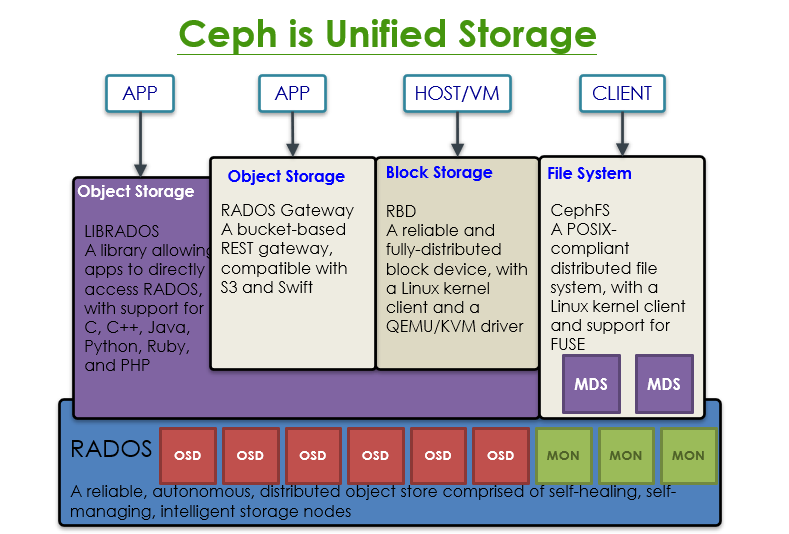Open source, distributed and self-healing
Unified Storage Solution with Ceph
Software-defined storage convenience with Ceph
The modern, distributed open source system Ceph provides access to object-, block- and file-storage.
As a platform for software-defined storage (SDS), Ceph can serve both as a scalable storage appliance for critical enterprise data and as a private cloud backend. SDS in this context means that a ceph solution is based on software intelligence. This storage variant avoids, for example, expensive purchases such as hardware controllers. In addition, the system saves a disproportionate number of data carriers to ensure the necessary protection of the data.
Furthermore the open source file system Ceph allows access to object-, block- and file-level. In addition, a ceph system protects the data stock by intelligent and economical distribution and replication of the individual fragments. However, the developers paid particular attention to its scalability: Within the ceph world, a cluster is not subject to any restrictions. If additional storage space is required, it is therefore sufficient to add more servers. Meanwhile, the Auto Load Balance function ensures that the data is evenly distributed across the mounted drives.
- Open source software defined storage
- Runs on standard hardware
- Self-management and self-healing
- Massive scalability

Intelligent storage architecture with Ceph
Monitors and Object Storage Devices
To ensure the integrity of the data, Ceph uses two different function blocks for this purpose: Monitors (MONs) for client authentication and monitoring of the cluster health and Object Storage Devices (OSDs) to store the actual data. OSDs can also be operated as metadata servers.
For secure data storage Ceph can use either replica or erasure coding profiles. By replicating, the system creates a defined number of copies of the data.
Erasure Coding, on the other hand, relies on an algorithm that makes more efficient use of the available raw capacity by increasing CPU and RAM usage.
Finally, in the so-called Crush Map (Controlled Replication under scalable Hashing), Ceph defines the storage locations: i.e. which data is stored on which OSDs.
Ceph as a unified storage solution…
- avoids single points of failure
- offers an economic construction and maintenance of clusters in the petabyte range
- enables scaling at any time without obligatory downtime
- avoids bottlenecks and performance drops at high usage rates

With PetaSAN to the Ceph Cluster
Our Ceph Storage solution on x86 hardware
The cluster solution PetaSAN can be expanded variably. A PetaSAN cluster grows in capacity as well as in performance: additional nodes can be added at any time without interruption.
Basically, PetaSAN provides the user with highly available, clustered iSCSI hard disks that can be accessed via multiple access paths and are identifiable by their virtual IP address. PetaSAN has also already implemented modern cloud-based technologies.

Ceph Storage Appliance Ambedded Mars 400
Our ceph storage solution on efficient ARM microservers
Ambedded has tailored the Mars 400 storage appliance and thus the ARM hardware precisely to Ceph. The 1U appliance consists of eight separate microservers, each with its own hard disk for storage tasks and a separate SSD for journaling.
The customer still receives a distributed open source SDS system with access to object-, block- and file-storage. The innovative architecture of the Mars 400, with its efficient ARM processors, ensures exceptionally low power consumption.
Mars 400 servers already offer high-availability security in three versions, but as a cluster they actually consume less than 400 watts of power.

Proxmox VE mit KVM und LXC
Complete open source virtualisation with Ceph
Our open source solution based on Proxmox masters software-defined storage and network functions in addition to virtualisation. Proxmox supports both the KVM hypervisor and LXC containers. The successful HA concept also integrates the so-called multi-master design, which does not require an additional management server.
Thanks to Ceph support, a scale-out cluster can be set up, which guarantees a redundant hardware concept and can be expanded at any time - even during operation.

Ihre Vorteile
Why Ceph from Starline?
Starline has stood for quality in the storage sector since 1982. We are at your side with our decades of experience in data storage and server systems.
Experienced and trained technicians do performance and functional checks and offer quick help in case of failure.
Starline has been active in the sector since 1982 and is a specialist in all aspects of data storage.
Starline maintains a high level of spare parts and is therefore able to supply spare parts long after the warranty period has expired.



